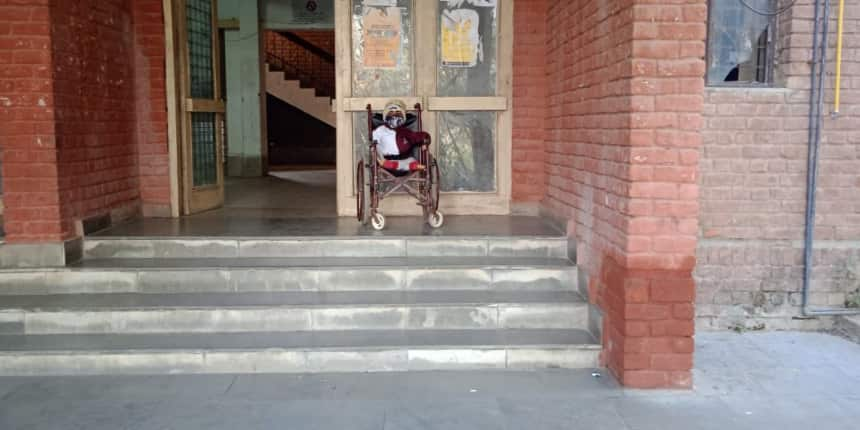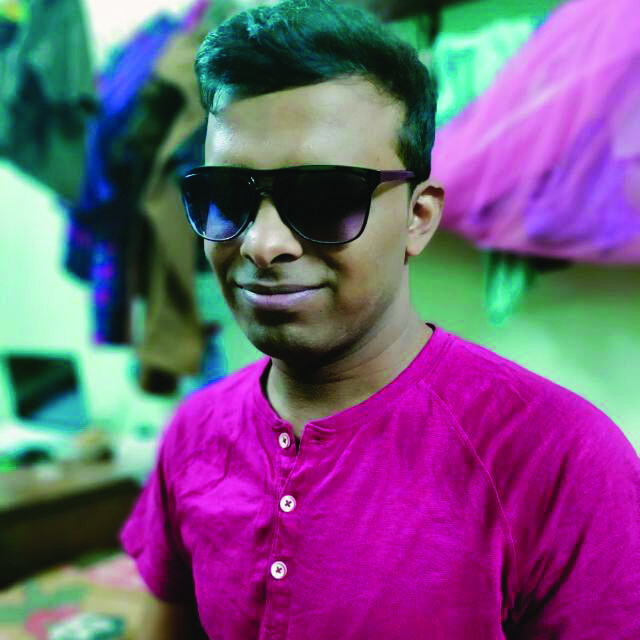Disabled university students are being ragged, harassed across campuses
R. Radhika | March 29, 2023 | 03:20 PM IST | 8 mins read
The number of disabled persons in higher education has dropped 14% from 2019-20 to 2020-21, shows AISHE

NEW DELHI: Amit Kapuri, a third-year undergraduate student of history at Jadavpur University was terrified to step out of his hostel room after a “disturbingly loud” ragging episode in October last year.
Kapuri, partially visually-impaired, was verbally abused, mocked for his disability and made to do difficult tasks by an ex-student, still residing in the New Block hostel after graduating.
“Around 11 pm, two friends and I were sitting in the hostel compound and suddenly [the ex-student], inebriated, began shouting slurs and abusing us. He was making fun of my disability without any provocation. I was told that ragging was considered to be a bonding exercise between the seniors and juniors and decided not to report the incident,” Kapuri told Careers360.
The incident, unreported, did not affect the perpetrators but made Kapuri’s life at the hostel difficult. “I was told not to step outside the room or be seen around to be spared abuse or harassment. I was horrified at his tone and the way he shouted at me,” he recalled.
Access to education has become a nightmare for students like Kapuri who are not only dealing with harassment and abuse but also forced to push authorities for action.
Higher education regulator, University Grants Commission (UGC) and All India Council for Technical Education (AICTE) have asked colleges and universities to implement ‘Accessibility Guidelines and Standards for Higher Education Institutions and Universities’ to provide easy access to higher education to persons with disabilities (PwDs). However, there are innumerable gaps in implementation.
According to the guidelines, universities must ensure that all buildings and facilities are wheelchair-accessible and disabled-friendly; develop bridge courses for students from disadvantaged educational backgrounds, and provide socio-emotional and academic support through counselling and mentoring.
Also Read| ‘Person, not anatomy’: How disabled MBBS students fight challenges in medical colleges
While the infrastructure may have caught up to the standard in some places, students complained of the absence of sensitisation and empathy.
As per the latest All India Survey of Higher Education, the number of students in the Persons with Disabilities category has dropped 14 percent in 2020-21 with 79,035 students. In the previous year, 92,831 students with disabilities were part of the higher education system.
More incidents, lax security
Days after Kapuri’s incident, another visually-impaired student, Buddhadev Jana, was physically assaulted, allegedly by the same person, when he came to the New Block hostel looking for a scribe to help him write an exam.
 Suraj Jha, convener, Forum for Students with Disability, Jadavpur University.
Suraj Jha, convener, Forum for Students with Disability, Jadavpur University.
“In November last year, Buddhadev was humiliated for being blind and even physically assaulted when he went to the hostel to arrange for a scribe. It was around 5-6 pm when [the same ex-student] started attacking him in a drunken state,” alleged Suraj Jha, convener, Forum for Students with Disability, Jadavpur University.
Incidents of ragging, abuse and harassment are rampant in the West Bengal state university but never drew serious attention from the authorities. Pushed by FSD, the university has constituted a one-person judicial committee to look into Jana’s case. However, the university has been “callous” in its approach, alleged students.
Also Read| Rage On Campus: Why ragging persists in medical and dental colleges in India
“The incident was first reported to the FSD and then the matter went to the principal. Till this date, the university authorities have not summoned or questioned the accused on this matter. The victims have been questioned several times but not once the person who is the prime accused was called for investigation in this whole scenario,” said Jha.
According to Jha, the university has received several cases of ragging cases from students with disabilities but the “university’s lack of willingness” did not change the situation.
“Before FSD came into the picture in 2017, many such [ragging] cases were reported from our community. Many of our students come from underprivileged backgrounds. Not all are brave enough to stand up when they are subjected to harassment. The forum was built on the premise that it will provide support to the disabled students and fight for their rights,” said Jha, who is also visually-impaired.
The forum currently has 115 registered members on campus.
Mustering courage after Jana’s case came to light, Kapuri decided to come forward and finally file a complaint on the incident that occurred months before. After initially dragging its feet, the university finally merged Kapuri’s case with Jana’s in January 2023.
“Amit [Kapuri] was offered a separate hostel accommodation but how is it a solution? The university, instead of removing the culprit, thought of relocating the victim. The students, especially in the engineering section, have created a myth that if you do what you are told when being ragged, you will earn favours later in placements and viva. If the miscreants are allowed to roam how can someone feel secure in their hostel?” Jha asked.
Also Read| Equal Right to Learn: Why a disability rights NGO has moved SC over online education
Sexual harassment
The issue is not restricted to a single institution. In Uttar Pradesh, a group of differently-abled students at Banaras Hindu University (BHU) held a protest that lasted 19 days in February.
Among several demands, the students sought improved security on campus after a visually-impaired student was sexually assaulted by a youth on the pretext of offering her a lift on campus in January this year. The students believe that the university, which was earlier proactive in providing for the community, has let go after the pandemic.
“The university space, during my undergraduate days, had developed robust mechanisms for disabled students on campus over the years. This was a joint effort between the students and the university. After COVID, most of the mechanisms fell apart. A committee to address such issues was disbanded,” said Abhay Kumar Sharma, a visually-impaired postgraduate student.
The university has assured students it will meet their demands. Apart from bearing the legal costs for the survivor, the BHU vice-chancellor has promised bus services for the disabled, guidelines to prevent verbal abuse and increased security on campus. Although, the students had to hold the university to its promises, making up for its own lack of will, said Sharma.
“On our personal level, we all have sacrificed days of classes, presentations and other important commitments for the larger issue. I am a professional comedian and had to give away several gigs and sit for this protest to draw [the] authority’s attention. Nevertheless, this protest has made students aware of their rights,” he said, adding, “There are two things: first, providing equal opportunities and second, accepting the students and bringing them at par with others. However, the university is yet to do a lot on both fronts.”
Lacking facilities
Although there are UGC guidelines, the universities are yet to implement several recommendations. According to students, the university has not yet made provisions to accommodate all 21 types of disability recognised by the Government of India.
Also Read| How Odisha is failing its 1.4 lakh children with special needs
“Despite guidelines, the university is yet to make tactile paths for visually-impaired people with secure directions for their journeys. Assistive devices for reading are also not provided. Here PwD [persons with disability] students are supposed to get all the help they need on their own. Since I am a student of National Institute for the Empowerment of Persons with Visual Disabilities (Divyangjan), I got a laptop, audio devices to learn from recorded lectures and other such help,” said Soniya, a PhD candidate at BHU, who does not use a last name.
“There are different types of disabilities like locomotive, hearing, orthopaedics and others. We need a committee that understands these disabilities and accordingly makes provisions inside the campus for them. Like for hearing impairment, colleges must have sign language in classrooms; for the visually-impaired, a sound signal device; for orthopaedic disabilities, vehicles should be provided in this vast campus and/or provide closest hostels to their classrooms among others,” she added.
Sharma said: “The departments have ramps for easy access but at the university-level, assistive devices have not been provided as such. Most students, like me, have access to technology with the help of various government schemes.”
The Scheme of Assistance to Disabled Persons for Purchase/Fitting of Aids and Appliances, or the ADIP Scheme, is one of the oldest schemes to provide disabled persons durable, sophisticated and scientifically manufactured, modern, standard aids and appliances. The scheme provides an accessible mobile phone once in five years and a laptop to students above 18 years of age.
A 2022 parliamentary standing committee report on ‘Assessment of Scheme for Implementation of the Rights of Persons with Disabilities Act, 2016 (SIPDA)’ had shown that “there was massive underutilisation of funds which led to arbitrary decision to reduce the funding towards persons with disabilities”. “They wish to remind the ministry that redressal of grievances is one of the most important rights envisaged under this Act and dilution in establishing an appropriate mechanism for the same would be an injustice to PwDs, who are one of the most marginalised sections in the country,” the report observed.
“I have tried to reach the dean of students before to take our demands forward. However, the authorities usually put it off. The Dean of Students told me that installing a sound signal device will not help because it will be broken as soon as it is installed. We have put our demands again before the VC and dean and hopefully, they will not be ignored,” said Soniya.
As per the Divyang committee constituted after the stir, the central university in Varanasi, Uttar Pradesh, currently has 708 students with different types of disability.
Scholarship trouble
Scholarships are also a long-standing issue. In August last year, scholars selected for the National Fellowship for Persons with Disabilities (NFPwD) had written to union ministers and UGC chairperson, calling the delay in disbursement of fellowships “a violation of the fundamental right to equality”, The Hindu had reported. Barring disbursement delays, the students also struggle to make ends meet with the limited scope of scholarships.
“Many of the students, especially PwD, in our campus come from poor financial backgrounds. Since the government has a rule that a student can apply for only one scholarship, it becomes problematic for us. We are unable to continue our higher studies because at least Rs. 2,000 is for hostel and mess food. Plus, there are expenses like mobile phone recharge, payment for readers and scribes and many such expenses that are not taken into account. The government should allow students to apply for at least two or three scholarships at a time,” said Jha.
Follow us for the latest education news on colleges and universities, admission, courses, exams, research, education policies, study abroad and more..
To get in touch, write to us at news@careers360.com.